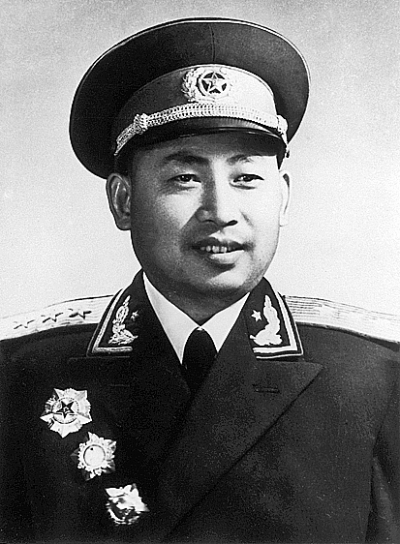【Genealogy of Heroes and Martyrs for National Rejuvenation】
Nanning, 18 Aug (Xinhua) -- "A young man came out of the storm, saw the shattering of the land, and resolutely left his hometown to find the road to save the country and the people..." At the cultural performance in Guilin City, Guangxi Province, to celebrate the 70th anniversary of the founding of the People's Republic of China, the actor used the local traditional oratorio art "Wenchang" to chant a song "General's Endowment" to commemorate a general, he was the founding general Li Tianyou.

Li Tianyou was like Xinhua News Agency
Li Tianyou, a native of Lingui, Guangxi, was born in 1914 to a poor peasant family in Liutang Town, Lingui. In 1928, at the age of 14, Li Tianyou went to serve as a soldier under the famous Gui general Li Mingrui. In September 1929, Li Mingrui's rebellion against Chiang Kai-shek failed, and under the covert contact of Zhang Yunyi, Li Tianyou joined the Communist Party of China in October of the same year. In December, Li Tianyou participated in the Baise Uprising, successively serving as a platoon commander and company commander of the 7th Army of the Chinese Workers' and Peasants' Red Army, and participated in the struggle to open up and defend the Right Jiangsu Region.
In 1931, Li Tianyou went with his troops to the Border Area of Guiqian, Xiangzhou, Guangdong and Gansu, and repeatedly led the whole company to charge forward at critical moments, covering the safe evacuation of the head of the military headquarters and leading organs, and was known as the "Little Tiger Company Commander". In February 1932, due to the "Left" mistake, the Red Army attacked Ganzhou. During the battle, Li Tianyou led the death squad to the city first, and was shot three times in a row, seriously injured.
In August 1933, Li Tianyou, the commander of the 13th Regiment of the 5th Division of the Third Red Army, commanded his regiment to annihilate all the 366th Regiment of the 62nd Division of the Kuomintang 19th Route Army, and the Red Army annihilated the enemy regiment with one regiment and one regiment for the first time in a mobile war. Li Tianyou was awarded the Third Class Red Star Medal and the "Heroic Model Regiment" pennant.
In January 1934, at the age of 20, Li Tianyou was promoted to the commander of the Red 5th Division, and in April of the same year, in the fifth anti-"encirclement and suppression" battle, facing an enemy with aircraft cannons and several times the number of his own, Li Tianyou commanded the troops to hold out for three days and three nights while wounded, until he received the order to retreat. During the Long March at the end of November of the same year, in the Battle of Xiangjiang, which broke through the enemy's fourth blockade line, Li Tianyou was ordered to lead two regiments to block two divisions of the Kuomintang army at Xinxu, Guanyang, Guangxi, to ensure the safety of the left wing of the central column. In the case of a huge disparity in the strength of the enemy and us, Li Tianyou led his troops to fight hard until the central column crossed the Xiang River.
After the outbreak of the National War of Resistance Against Japanese Aggression, Li Tianyou served as the commander of the 686th Regiment of the 343rd Brigade of the 115th Division of the Eighth Route Army. In September 1937, Li Tianyou participated in the Battle of Pingxingguan, led his troops to take on the main attack, severely damaged the elite troops of the Japanese army, and captured the Laoye Temple, the commanding height of the battlefield, which played a key role in the victory of the battle. In October of the same year, Li Tianyou led his troops to participate in the Ambush of Guangyang, annihilating more than a thousand Japanese troops. Later, he served as the deputy brigade commander and acting brigade commander of the 343rd Brigade, and transferred to the Lüliang Mountains area, commanding the Battle of Jinggou in Wucheng, and participating in the opening up of the anti-Japanese base area in southwest Jin.
During the Liberation War, Li Tianyou successively served as chief of staff of the North Manchuria Military Region, commander of the Songjiang Military Region, commander of the 1st Column of the Northeast Democratic United Army, commander of the 38th Army of the Northeast Field Army, and first deputy commander of the 13th Corps of the Fourth Field Army. In the battle to liberate Tianjin, he commanded the westward troops to take the lead in capturing Jintang Bridge and capturing Chen Changjie, the commander of the Tianjin garrison of the Kuomintang army, alive.
After the founding of the People's Republic of China, Li Tianyou successively served as deputy commander and commander of the Guangxi Military Region, first deputy commander and acting commander of the Guangzhou Military Region, deputy chief of the general staff of the People's Liberation Army, and member of the Central Military Commission of the CPC. He participated in leading the battle against the remnants of the Kuomintang and bandits in Guangxi, aiding the Vietnamese struggle to resist the United States and the regularization and modernization of the People's Liberation Army. He was awarded the rank of General in 1955. He died in Beijing in September 1970.
Li Tianyou was brave and good at war, fought all his life, and established outstanding merits for national independence and liberation. Zhang Zhen, former vice chairman of the Central Military Commission, praised him: "All his life he was loyal, unswerving, heroic and good at fighting, and a model for our army." ”
Guangming Daily ( 2019-08-19 04 edition)